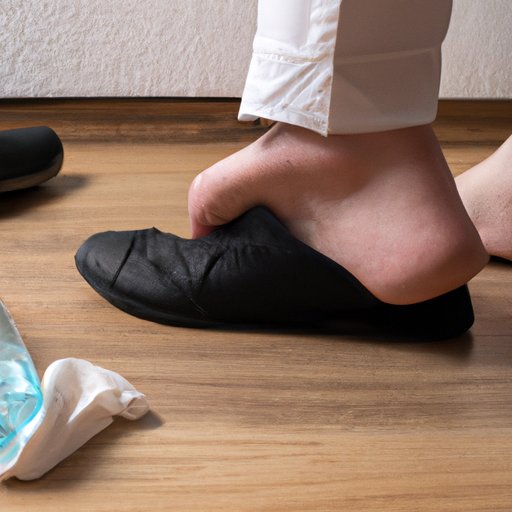Introduction
Do you often find yourself slipping and sliding in your shoes due to sweaty feet? Excessive foot sweating or hyperhidrosis is a common problem that affects many people worldwide. While sweating is a normal bodily function, excessive sweating can be uncomfortable and embarrassing, leading to social anxiety and foot odor.
In this article, we will delve into the causes of excessive foot sweating, popular remedies, the best shoes for sweaty feet, prevention strategies, and when it’s appropriate to seek medical help.
Causes of excessive foot sweating
Some people are prone to excessive sweating due to their genetic makeup. Also, some medical conditions and environmental factors can trigger excessive sweating.
Sweat is produced in the sweat glands when the body temperature increases as a cooling mechanism. The nervous system stimulates the sweat glands to produce sweat. However, some people have sweat glands that are more active, leading to excessive sweating. Additionally, men tend to sweat more than women, and people who are overweight also experience excessive sweating.
Underlying medical conditions such as hyperthyroidism, anxiety disorders, menopause, and diabetes can also cause excessive sweating. Medications such as antidepressants, narcotics, and blood pressure-lowering medications can also trigger excessive sweating.
Environmental factors such as hot weather, tight shoes, lack of air circulation, and prolonged standing can worsen excessive sweating.
Home remedies for sweaty feet
Home remedies are a cost-effective way of reducing the severity of foot sweating. While these remedies may not eliminate excessive sweating, they can be helpful in reducing the severity of the condition.
Vinegar soak is one popular remedy for treating sweaty feet. Vinegar has antimicrobial properties that can inhibit odor-causing bacteria while balancing the pH of the feet. Soak your feet in a basin of warm water mixed with half a cup of vinegar for 15-20 minutes, twice a day.
Black tea contains tannins that can reduce sweating by clogging the sweat ducts. Make black tea with two tea bags and a pint of hot water. Add two quarts of cold water and soak your feet for 30 minutes before bedtime.
Wearing socks made of breathable materials such as cotton or bamboo can help absorb sweat. Open-toed shoes or shoes with breathable leather or mesh can allow air circulation and prevent moisture buildup.
Best shoes for sweaty feet
Proper footwear is essential for preventing excessive sweating and foot odor. While footwear can’t stop sweating, wearing appropriate shoes can promote air circulation and prevent moisture retention in the feet.
Moisture-wicking socks are made from materials that can evaporate sweat before it causes bacteria to develop. These socks are effective in keeping the feet dry and comfortable.
Breathable shoes are designed with fabrics such as mesh, which allows ventilation. Leather shoes can also be breathable if cut to allow for air circulation.
Sandal-style shoes are beneficial for people with sweaty feet as they allow air circulation and prevent moisture buildup.
How to prevent foot odor
Foot odor is a common problem associated with excessive sweating. The smell is caused by the bacteria that thrive in the moist and warm environment of the feet.
Washing the feet twice a day with warm soapy water can reduce bacterial activity, and using antibacterial soap can kill bacteria. Dry the feet thoroughly after washing to prevent moisture buildup.
Using foot powder or talcum powder can absorb sweat and keep the feet dry. Changing shoes daily and alternating between shoes can allow them to dry and prevent bacteria from multiplying.
Role of diet in excessive sweating
Diet can significantly influence sweating levels. Certain foods and drinks can increase sweating, while others can reduce excessive sweating.
Caffeine, alcohol, and spicy foods can increase sweating levels in some people. Consuming foods rich in magnesium, such as leafy greens and nuts, can help regulate sweat production. Drinking plenty of water and reducing sugar intake can also help regulate sweating.
When to seek medical help
If home remedies and prevention strategies are not effective in reducing excessive sweating and foot odor, it may be time to seek medical help. Diagnosing excessive sweating involves a physical examination and medical history assessment.
There are several available treatments for excessive sweating, including topical prescription antiperspirants, botox injections, and oral medications. A dermatologist or healthcare provider can advise on the most appropriate treatment plan.
If you’re planning to visit a dermatologist or healthcare provider, note any patterns in your excessive sweating, such as the affected areas and times of the day. Prepare a list of medications or supplements you’re currently taking, as some of these may cause sweating.
Conclusion
Excessive foot sweating can be a cause of discomfort and social anxiety. The condition can be managed with proper hygiene, footwear, lifestyle changes, and medical interventions. Taking care of your feet can significantly improve your comfort and quality of life.
Try some of these home remedies and prevention strategies, and consult a dermatologist if you’re experiencing severe or persistent excessive sweating. By taking control of your excessive foot sweating, you can put your best foot forward.
